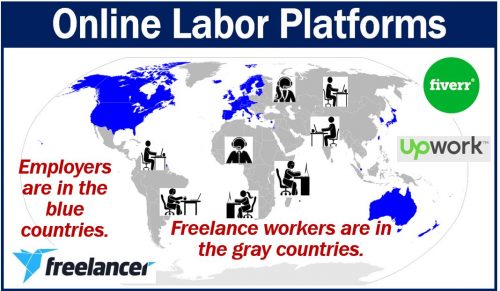Online labor platforms connect clients with freelance workers internationally. They are emerging as an alternative to offshoring, say researchers from the University of Oxford.
Offshoring means relocating part of a company’s operations abroad. It may include the relocation of accounting, telemarketing, manufacturing, or production. In fact, it may include any part of a company’s business operations.
Workers who live in emerging economies, in particular, are benefiting from these labor platforms. The researchers, from the Oxford Internet Institute, wrote about their study and findings in the Journal of Management (citation below).
Online labor platforms, – simple and cheap
The authors revealed that online labor platforms such as Fiverr, Freelancer, and Upwork offer companies in the advanced economies a cheap and simple mechanism to hire knowledge workers in lower-income nations. They can do this without the burden of having to set up offices abroad. Neither do not need to contract out work to an outsourcing company.
An advanced economy is a developed country, i.e., an industrialized country or a rich country.
Lead author Professor Vili Lehdonvirta said:
“Many knowledge workers in emerging economies are benefiting from this arrangement. Knowledge workers who previously worked at outsourcing companies in countries like the Philippines, for example, can now work directly for Western clients through these online platforms.”
“Workers can earn more this way, and avoid grueling commutes. However, their income and work hours can be less predictable.”
Prof. Vili Lehdonvirta is an Associate Professor and Senior Research Fellow at the Oxford Internet Institute.

Using online labor platforms is simpler and cheaper than offshoring.
Providing clients with information on available workers
Online labor platforms use a range of ways to provide clients and potential clients with information on worker skill set and productivity. They carry out, for example, skill tests, and also look at reviews from previous clients.
Co-author Dr. Otto Kässi said:
“Workers benefit from having this information available to clients. We found that clients are highly influenced by information on worker performance when choosing whom to hire.”
“Moreover, our findings show that workers from low-income countries benefit much more than workers from high-income countries.”
Dr. Otto Kässi, a labor economist, is a Researcher at the Oxford Internet Institute.
One possible explanation for this finding is that clients in the advanced economies tend to assume that low-income country workers are less skilled. Perhaps they may think they are less productive. That is, unless they have clear evidence to the contrary.
One study participant, a knowledge worker, said:
“Once (…) you do get those first few projects and you get good feedback, then it doesn’t really matter anymore that you’re from the Philippines.”
Experience boosts hourly rates for workers differently
A worker in an emerging economy can see his or her hourly rate rise by 5% with just one extra project’s worth of work history.
Workers in the advanced economies, on the other hand, get much smaller increases. Typically, they will only see a 0.1% average increase in their hourly rate for each additional project.
Online labor platforms won’t eradicate global wage gaps
It is unlikely that online labor platforms alone will close global wage gaps. There is still a gaping wage gap between workers in emerging versus advanced economies.
In the Philippines, for example, a graphic designer earned (average) $8.47 per hour. Their counterparts in the United States, on the other hand, earned an average of $19.53 per hour.
Prof. Lehdonvirta said:
“Our findings imply that a worker from the lowest-income country would need to have around a thousand projects’ worth of work history on the platform to obtain the same hourly rates as a worker from the highest-income country.”
Online labor platforms benefitting from client perceptions
Clients generally perceive workers in low-income countries differently from their counterparts in the advanced economies. The researchers found that online labor platforms were benefiting from this.
Dr. Kässi said:
“The experience and project history that low-income workers build up on a specific platform is so valuable to their ability to secure future work.”
“This creates very high switching costs for workers to move between platforms. We should be looking at the implications on things such as dependence, value capture, and working conditions, in the same way that we would scrutinize the effects of multinational enterprises and traditional outsourcing.”
Citation
“The Global Platform Economy: A New Offshoring Institution Enabling Emerging-Economy Microproviders,” Vili Lehdonvirta, Otto Kässi, Isis Hjorth, Helena Barnard, and Mark Graham, Journal of Management (2018). DOI: ttps://doi.org/10.1177/0149206318786781.
